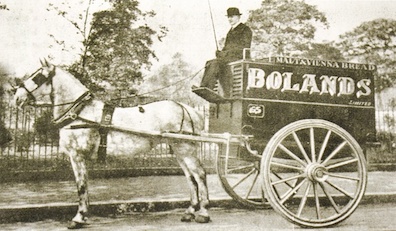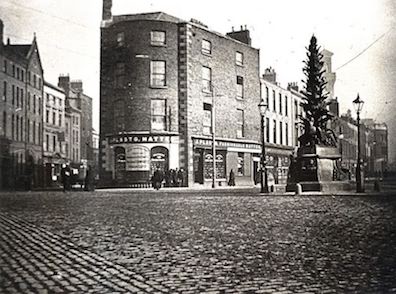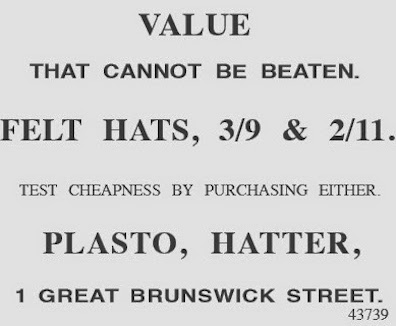As Bloom walks down the sunny side of Eccles Street "in happy
warmth," he sees or thinks of "Boland's breadvan"
delivering warm freshly baked loaves of bread. The largest
bakery in Dublin in 1904, Boland's had a large fleet of vans
to distribute its products to shops, restaurants, and houses
throughout the city. The Boland family lived on Capel Street, which starts
across the river from Temple Bar and runs north. They built
their first bakery at 134-136 Capel. As the business expanded
it opened new facilities, including a large flour mill, silos,
and warehouses on the Grand Canal Quay near Ringsend, and ornately
appointed retail stores at various locations. (The vans, soon
afterward equipped with gasoline engines, continued motoring
about the capital for most of the 20th century. In the 1970s
Boland's merged with Jacobs Biscuits Ltd., the firm whose
biscuit tin the Citizen throws at Bloom in Cyclops,
to form Irish Biscuits Ltd.)
Passing by O'Rourke's pub
at the east end of Eccles Street (and Cassidy's liquor store
across the street), Bloom turns right onto Dorset Street.
Before leaving the house he has rejected the idea of buying "a
mutton kidney at Buckley's" in favor of "a
pork kidney at Dlugacz's."
Both shops are on Dorset Street Upper, Buckley's at number 48
and Dlugacz perhaps at 55A (the actual butcher at that address
was named Michael Brunton). As he is standing in Dlugacz's
shop, the girl in front of him orders "a pound and a half of
Denny's sausages," which came from Limerick. Buying meat on
Dorset Street Upper is a frequent trek for Bloom; in Penelope
Molly thinks, "Im sick of that everlasting butchers
meat from Buckleys."
If Bloom had turned left onto Dorset Street Lower
(moving northeast, away from the center of town) he would have
come to two other businesses mentioned in Calypso. "Hanlon's
milkman," who has delivered the morning's milk in
an anonymous urban equivalent of the old woman's personable
visit to the tower in Telemachus, probably works for
S. Hanlon, a dairyman at number 26. And "M'Auley's
down there" (toward the North Circular Road from
where Bloom is standing on O'Rourke's corner) is Thomas
M'Auley, grocer and wine merchant at number 39. Bloom thinks
that M'Auley's location is "n.g." (i.e., no
good) because it is too far north: O'Rourke's is "just the end
of the city traffic."
As Bloom walks back home along Dorset Street Upper reading an
ad for a Palestinian farm,
he thinks of "Silverpowdered olivetrees. Quiet long days:
pruning, ripening. Olives are packed in jars, eh? I have a few
left from Andrews." According to the 1904 Thom's
directory, Andrews & Co. were tea and coffee dealers,
wine and spirit merchants, and Italian warehousers at 19-22
Dame Street, in the heart of central Dublin on the south side
of the river, just south of Temple Bar. They were a place to
find exotic delicacies. In Circe Bloom thinks, "Try
truffles at Andrews."
Several other businesses pop up from the southeastern part of
the city. The "high grade ha"(t) that Bloom takes off a peg on
his hallstand comes from "Plasto's," owned by hatmaker
John Plasto, at 1 Great Brunswick (now Pearse) Street, south
of the river several blocks from Sackville (now O'Connell)
Street. The funeral procession passes it in Hades,
and Sirens glimpses Blazes Boylan "wearing a straw
hat very dressy, bought of John Plasto of number one
Great Brunswick street, hatter."
Bloom also thinks of an argument he had with Milly "in
the XL Cafe" at 86 Grafton Street. Grafton is a
fashionable shopping street southwest of Trinity College. Two
blocks east of Grafton lies Dawson Street, where Adolphe
Drago, hairdresser and wigmaker, had one of two "Drago's"
shops. In Lestrygonians Bloom sees a dye-maker's van
parked in front. (The other shop was at 36 Henry Street, north
of the river near Sackville Street.) And, finally, Bloom
thinks of a performance of Ponchielli's dance of the hours by
"May's band," which Gifford notes was
maintained and supplied by the music sellers May & Co. at
130 St. Stephen's Green West.
Bloom also thinks in Calypso of the Capel Street library where
he must renew a book he has checked out, and of a nearby music
business at 14 Capel Street run by a man named Kearney, his
"guarantor." He remembers visiting Hengler's circus, which
performed at the Rotunda on Parnell Square, at the north end
of Sackville Street. And he contemplates visiting the Tara Street baths, north of
Trinity College on the way to the Custom House.




